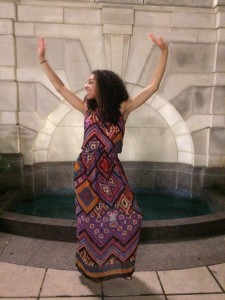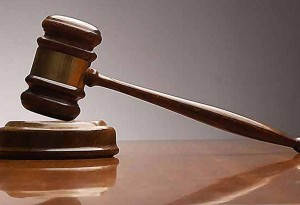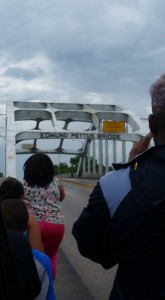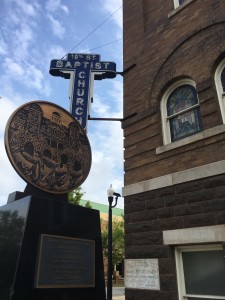The Ever-Present Relevance of Civil Rights Within Our Democracy – Robin Lauermann
”A law is unjust if it is inflicted on a minority that, as a result of being denied the right to vote, had no part in enacting or devising the law. Who can say that the legislature of Alabama which set up that state’s segregation laws was democratically elected? Throughout Alabama all sorts of devious methods are used to prevent Negroes from becoming registered voters, and there are some counties in which, even though Negroes constitute a majority of the population, not a single Negro is registered. Can any law enacted under such circumstances be considered democratically structured?”
– Martin Luther King, Jr. (1963) “Letter from a Birmingham Jail”
For nine days, we traveled through nine states, visiting historical and contemporary sites of significance and talking with veterans of the Civil Rights movement. Of all the impactful takeaways – and there were many – this experience affirmed my value of civic engagement, especially the extent to which the right to vote supercedes other rights and privileges because of its ability to check government power and inhibit the infringement by citizens on the rights of one another through legislation. Potential weakening and reversals of legislation upholding citizens’ rights to register and vote reveal that not only must we appreciate the sacrifices for this right, but we must also remain vigilant in its ongoing protection.
My first personal experience with the topic of race and ethnicity – at least the first of which I had awareness – came in grade school when something inconceivable, at least to my elementary-school mind, occurred. One morning, in the early 1980s, I awoke to news and a picture of a burning cross, at a home just next to my school in the suburbs of Buffalo, NY. That home belonged to a class-mate, our school’s only African American student. This incident shocked, sickened and scared me; I can only imagine the impact it had on her and her family.
Following a rather superficial education in this area during elementary and secondary school, not an uncommon experience even to this day, I began to dig in deeply to these issues in both my undergradute and graduate studies in political science: Context courses, legal and other policy courses, and even a year working as a research assistant to a faculty member working on a book about Title VI of the 1964 Civil Rights Act (which denied federal funding to entities discriminating on the basis of characteristics prohibited in the legislation). My academic work – teaching, research and institutional service -has had continued attention on this issue, especially as it relates to civic engagement. The civil rights tour vividly reinforced the importance of voting, as well as the sacrifices, which are often underappreciated in low voter turnout, made by those citizens who fought to exercise their rights.
After all these years, it is still mindblowing to consider that it took almost 100 years to pass a Voting Rights Act to protect the right guaranteed to African Americans by the 15th Amendment. This delay is especially troubling because the lack of voting rights equated, as Dr. King noted, to a lack of representation in effect, both in the candidates who won and in the legislation that they passed. Although the right was backed by constitutional amendment, many tactics degraded African American access to the ballot, including but not limited to:
- Legal barriers
- Literacy tests – which included problematic wording so that even those who knew the answers might not get it right (For example, one question asks which type of cases before the Supreme Court may be changed by congressional law; the answer included the term co-appellate rather than appellate
- Poll taxes
- Requirement for a white to vouch for a non-registered African America
- Informal power barriers
- Eviction from sharecropping property
- Termination of employment
- Lynching and other terrorist acts against individuals, black and white, who attempted to register voters.
Although legislation prior to the Voting Rights Act attempted to redress some of these issues, they were, at best, only partially successful. Understandably it would take more to motivate more significant change, as only 325 African Americans living in Dallas County, including Selma, had successfully registered by 1965!
Of the many pieces of the voting rights story shared throughout the tour, the part that most viscerally impacted me was the time spent in Selma, Alabama with Joanne Bland. Hearing from her about her experiences in the movement more largely – she had been arrested something like 13 times for countering segregation laws by the time she was 11 – gave a personal context for the struggle. Her description of the events surrounding the planning for the march from Selma to Montgomery, including its unsuccessful first attempt that resulted in Bloody Sunday, conveyed the scope of the participants’ support and determination to work peacefully within the system to challenge the deprivation of their rights. When we concluded our time with Ms. Bland and retraced the steps of the March over the Edmund Pettus Bridge, I had chills and brimmed with emotion that surpassed anything I had grasped from reading historical descriptions, watching actual footage or seeing the dramatic presentation of the events in the movie Selma.
Further study and attention to current events reveal that progress towards full access to these rights is not irreversible. The Voting Rights Act was significant, but still suffered from challenges in enforcement – there is a reason why policy folks note that the implementation of a law is the key to its success. Although registration rates have increased among the African American population, recent elections still have evidence of tactics discouraging individuals from exercising their rights at the voting booth. Renewals of specific sections of the VRA, requiring clearance of plans for states with history of most egregious deprivation of voting rights, have been watered down. In addition, partisan gerrymandering, which is an ethical but not illegal activity, provides a proxy for diluting the vote of African Americans and others through “cracking” and “packing” of districts when the boundaries are redrawn every 10 years following each census. (North Carolina’s 12th Congressional District has been a gross example for decades and only recently successfully challenged by federal court decision as racial gerrymandering). Some states have also recently adopted strict voter id laws, which disenfranchise the least economically priveleged, even in the absence of ANY systematic evidence in non-partisan research that voting fraud exists in any measurable levels. In short, the struggle is not yet over.
Ms Bland shared an idea with us that captured both the historical and contemporary significance of the civil rights movement. She noted that social movements are like a jigsaw puzzle, in which each of the participants is a piece; without any one, it is incomplete. I think that analogy can be extended further, by considering the movement as a mosaic puzzle, in which smaller images come together to create a larger picture. The aspect of voting rights, is just one segment of the movement, albeit one so fundamental as to affect all other rights. We must be aware of our individual role within democracy and act to preserve as well as strengthen it.
Filed under Uncategorized | Comment (0)So BLESSED! – Tiffany Burrows
 As we have been touring all of these museums and hearing from all these speakers, I am realizing all the more that everything bit of freedom that was desired had to be fought for. Blood literally shed for the everyday privileges I’ve taken for granted.
As we have been touring all of these museums and hearing from all these speakers, I am realizing all the more that everything bit of freedom that was desired had to be fought for. Blood literally shed for the everyday privileges I’ve taken for granted.
So I am now sitting in the hotel overlooking a beautify lit view, and just recently came from walking in downtown Nashville, I have this abundant sense of gratitude. :)
Filed under Uncategorized | Comment (0)Day 6: Memphis, TN (Abbey Combs)
This entry is not so much to reflect on this particular day, but rather the tour as a whole (thus far) and the themes that have been laid heavily on my heart for the last 6 days. We have seen so much this week and yet every day the same two themes have been overwhelmingly present: hate and love.
It was the hate that first stunned me. We’ve seen and heard of undeserved beatings, Emmett Till’s murder, children in jail, firehose attacks, Selma, the bombing of Sixteenth Street Baptist and signs that read “No negro or ape allowed in building.” I can’t begin to wrap my head around how human beings can first feel so much hate, and then act on it. It’s unfathomable. This week has awoken me to the reality and magnitude of hate in our earthly world. I’ve been forced to confront this hatred, not only in our history, but also in the present. The mass shooting in Orlando and my recent studies of migrants’ sufferings in Mexico make it very evident that hate is alive and well today.
At first, this new awareness of hatred consumed me. It discouraged me. Yet, I’ve increasingly found that wherever hate exists, there too, love seems to dwell. Hearing the personal accounts of those who lived through the Civil Rights Movement has given me more hope than I originally expected to find. They have consistently spoken of pain and fear, but their focus has been love. Listen to any of Martin Luther King Jr.’s sermons and you will find that love exudes from every word. In the face of terror and tragedy, he led the masses to respond in LOVE… that’s powerful.
And not just any ol’ love, but God’s love. The church was such an integral part of this movement; faith led every step of the way. Mrs. Juanita Abernathy, despite her hardships, repeatedly proclaimed that GOD IS GOOD. He knows what He is doing and she is grateful to have been where He placed her in American history. Carolyn McKinstry, who lost four friends in the Sixteenth Street Baptist bombing, prefers to focus on “what matters” when she shares her story. The bulk of her message was not about the horrors of September 15, 1963, but rather reconciliation and how we can show our love to God by loving others. Lisa McNair, sister of Denise McNair, admitted that hate will always be here. Yet, praise be to God, so will His love.
It’s amazing that those who have experienced the most hate in the world seem to be the ones who best understand love. This has been a humbling week… how amazing to be filled simultaneously with such great despair and great hope.
“All this will not be finished in the first 100 days. Nor will it be finished in the first 1,000 days, nor in the lifetime of this administration, nor even perhaps in our lifetimes on this planet. But let us begin.” -John F. Kennedy.
“Hate is too great a burden to bear… I have decided to love… He who hates does not know God, but he who loves has the key that unlocks the door to the meaning of ultimate reality.” -Martin Luther King Jr.
Filed under Uncategorized | Comment (0)Day 5: Birmingham, AL (Jake Edmunds)
As we are learning about the history of the Civil Rights – hearing the praises of the movement’s values, the passion of the movement’s leaders, and the mourning of the movement’s lost heroes – some of the lessons I have been taught about racial reconciliation have become much more concrete to me than they ever have before. Here is just one of them:
Several months ago, I heard some students from minority groups on campus try to explain to fellow students just why it’s difficult to be in a minority. From the perspective of the majority students, nobody hated anybody else for the color of someone’s skin, so why can’t we just move on? The response from students of color could be summarized like this:
“We don’t get to move on. We don’t have the privilege of not thinking about ethnicity. You (white people) can choose to disengage from these conversations. You can go around, ignoring the issue and talking to a bunch of other people who look like you and who feel the same way you do. We don’t have the privilege. We have to think about these issue every time we glance around and see that there are more people who look like you than there are people who look like me.”
Men and women in Selma during the Civil Rights era marched 54 miles to Montgomery because of the freedoms that were not offered to the black community. In Montgomery, they boycotted segregated buses for over a year because they were tired of facing, daily, the fact that they were viewed as inferior citizens. In Greensboro, students sat at a lunch counter because they were done being reminded of their ethnicity – and the way whites viewed their ethnicity – every time they ordered lunch. These were daily issues.
Now I understand that I may never fully understand that struggle. I may never understand how unique it may be to be able to simply not think about my ethnicity for a few days or weeks. I hope recognizing the limits of my understanding may be, in itself, a step toward a deeper understanding.
Filed under Uncategorized | Comment (0)Don Opitz in Birmingham
I was in the back of our group as we queued to enter the Birmingham Civil Rights Institute. A wise guide said: “Here’s what you really need to do, Read! You need to read all you can and you need to read every day.” The wind was blowing, and this is what I heard: “Here’s what you really need to do, Greive! You need to greive all you can and you need to greive every day.” Last night we had the honor of talking with Rev. Carolyn McKinstry, survivor of the bombing of Sixteenth Street Baptist Church where four little girls were killed. She has been greiving for 53 years, every day.
Read and Greive.
Filed under Uncategorized | Comment (1)Day 4: Montgomery, AL (Scott Zeigler)
The first thing that should be understood about me is that I am not a blogger and tend to be very private when it comes to sharing much of anything on the Internet. During the course of this remarkable trip I find myself flinching and cringing alternately with being amazed at exceptional demonstrations of courage.
Over the years I have enjoyed watching numerous documentary series by Ken Burns. One of my favorite documentaries is his series “Jazz”. I was aware of the horrible lynchings that were conducted in the South and many times they were conducted in front of crowds which included family members of all ages. It was through Burn’s series that I learned of a song entitled “Strange Fruit” written by Abel Meeropol under his pseudonym Lewis Allan and sung by the legendary Billie Holiday in 1939. The singing and recording of this song was a courageous act. It is a haunting song where the strange fruit mentioned refers to the victim of the lynching (by hanging and/or burning) that remained on the trees to be ravaged by the sun, wind and animals.
(Go to YouTube and search Billie Holiday Strange Fruit to hear the song or see the words of the song at http://ije.oxfordjournals.org/content/35/4/902.full)
Today, while visiting the Equal Justice Initiative (EJI) in Montgomery, Alabama I experienced a spine tingling cringe. As we entered the auditorium and turned around, we saw a display in the back of the room of large jars of soil labeled with a name and date of death, taken from known lynching locations to remember those victims who lost their lives in this terrible and hate filled manner. By rough counts there well over 220 jars of various hues of brown and black. To me, these hues represent the many different skin tones possessed by these individuals. These jars are a small portion of the 4,075 known lynchings. (I was not aware of this vast number.) Researchers are sure that more incidents exist where the details are unknown. I personally feel a wave of deep grief and gloom as I ponder the waste of life and imagine the sorrow and helpless frustration of family members. As Miss Holiday ended her first performance with this song and did no encore, I will end with the final words of the song to haunt and remind us of the atrocities of lynching, “here is a strange and bitter crop.”
Allan, Lewis; “Strange Fruit”, World Copyright (excluding USA) Edward B Marks Music Company, US copyright © 1939 (renewed) by Music Sales Corporation (ASCAP), All rights reserved
Filed under Uncategorized | Comment (0)Day 4- Let Justice Prevail! – Tiffany Burrows
 Today Todd led the group to Equal Justice Initiative, “private, nonprofit organization that provides legal representation to indigent defendants and prisoners who have been denied fair and just treatment in the legal system” (IJE website).
Today Todd led the group to Equal Justice Initiative, “private, nonprofit organization that provides legal representation to indigent defendants and prisoners who have been denied fair and just treatment in the legal system” (IJE website).
Their main location stems from Montgomery Alabama, but they also work “across the United States. [T]housands of children have been sentenced as adults and sent to adult prisons. Nearly 3000 juveniles nationwide have been sentenced to life imprisonment without the possibility of parole. Children as young as 13 years old have been tried as adults and sentenced to die in prison, typically without any consideration of their age or circumstances of the offense” (EJI website). Many of these children and adults are people of color.
I had heard that people of color are more likely to be sentenced to prison, proven guilty or not, but I did not realize how our own government system is set up to continue this cycle and not even pardon the many mistaken prison sentencings. What’s even more shocking is that on a economic stand point, it would be cheaper to implement rehabilitation programs than to continue to expand prisons and sentence people to death. Even so, millions of our tax dollars are taken to do otherwise. I began to question the people in power and posed the question, “How can our government leaders grow to such a position of power and manage people lives in such manner?” But then I quickly learned that people of power and influence tend to have little personal experience with someone imprisoned, poor, of color, etc… So, when they see this person who supposedly committed xyz crime, they are seen as a unredeemable criminal and not a human-being.
I want to be clear that not all people of power have this mind set and that there needs to a correction system in place for people who committed a crime(s), but full evaluation for whether the person even committed the crime should be a must and an equivalent sentencing should be made, along with programs set out to educate inmates and get them back on their feet post imprisonment.
A greater population of people that have committed a crime are less likely to commit a crime again. And if these people received the tools and opportunities to live a better life how much more would society improve.
Above all, the most profound moment for me is that our history of slavery and inequality amongst minorities is one of the influences for kind of system we have today. It’s said that slavery ended in the mid 1800’s, but I beg to differ. It now disguised within our government system. And worst of all, many don’t even know it. One of the best ways to keep injustice going, is to trick people into believing that it does not even exist. Even so, I truly believe justice will prevail and that we all can play role in getting the truth out. We do not need to worry about saving the world. We can start the work within ourselves and stem out from there. If we all play our part, we can all make a difference. It’s up to you to discover your role and like Nike, “Just do it!!”
Filed under Uncategorized | Comment (0)Don Opitz from Montgomery on Day 4
Beyond MLK, Rosa Parks and a few others, I didn’t even know the heroes and heroines of this bloody battle for freedom. The civil rights movement has been marginal in my schooling, and almost completely absent from the pulpit and SS classes of churches that I’ve attended. This trip has been in turns revealing and revolting as we have re-witnessed the callous and brutal racism, and it has been inspiring to hear the stories of courage and faith and sacrifice. The CRM was much deeper and wider than the work of pastors and organizers. The marginal saints of the movement appear in the pictures and films of each museum, and some of those names are etched in memorials and historical records. Thousands were faithful and forgotten foot soldiers who prayed and planned in town after town, in dorm rooms, church basements, lunch counters, and backyard BBQs. They risked, protested, and paid a high price for freedom. The gospel too was carried by marginal saints, not just heroes, and their names are recorded in the margins of the NT: Onesimus and Clement, Lydia and Phoebe, Aristarchus and Archippus. The testimony and light of all of these marginal saints burns on. Our own dark days must be continually lighted by heroes and by marginal saints like us, people who are willing to take the truth into the streets.
Filed under Uncategorized | Comment (0)Day 3: Albany, GA and Montgomery, AL (Paula Maynard)
Two weeks ago I had the opportunity to serve on jury duty. This was my first experience on a jury and I was called the first and fourth days to serve for criminal trials. The first case was very difficult because it involved a crime against a young child; however it was the second case that caused me the most anguish. This case involved a young African-American male who was being accused of intending harm/injury to a police officer and resisting arrest. At the time I was reading Jim Wallis’ America’s Original Sin: Racism, White Privilege and the Bridge to a New America, and all I could do during the jury selection process was pray. I was so distressed because I knew the chances of this young man receiving a fair trial were not good. I did not get picked to serve on that jury and while I was relieved due to the conflict in my own heart, I wanted to serve because I wanted at least one person who would offer this young man a fair trial. Unfortunately the entire jury consisted of white members, the judge was a white male, the defendant’s attorney was a white male and both the injured and arresting officers were white. I do not know the details of the case, nor do I know the verdict; however I can’t help but wonder if this young man became another statistic.
As we drove through the countryside and cities of Albany, GA and Montgomery, AL today, not only was I struck by the economic conditions of these areas (as evidenced by numerous dilapidated houses and structures, as well as vacant lots and buildings), but also by the number of bail bond repositories in Montgomery. Montgomery’s population in 2015 was estimated to be 226,519, and there are 30 places for people to acquire bail bonds. That seems like a lot of bail to me. What is happening in this city?
My mind wandered quite a bit today about the ongoing conditions of poverty, crime and justice (or lack thereof) in the South. And linking it to yesterday’s travesty in Orlando, FL I ask myself, “why is there so much hate?” There’s all kind of hate, as hate comes in all forms and levels of intensity. Why is it that we cannot overcome our hatred, or just animosity, towards one another?
In preparation for walking across the Edmund Pettus Bridge tomorrow I looked up the words to the old southern spiritual, “We Will Overcome.” (Thank you, Rutha Harris, for inspiring me today.) I hope we sing this song together as a group as we cross the bridge, because only working together can we overcome the prejudice and hatred plaguing every facet of this country today.
Filed under Uncategorized | Comments (2)Day 3 (Kenedy Kieffer)
Today was a very powerful day as we saw many historical landmarks, met Rutha Harris and got 2 rounds of “soul food”.
2 years ago I went to South Africa with my choir to learn about the power of music in times of national struggle and injustice. As I sat in the pew today listening to Rutha Harris sing “This Little Light of Mine”, I was reminded just how powerful music in times of injustice really is.
Many of the people during this movement were trying to find something to hold on to that felt familiar to them. These people couldn’t understand why they were being treated this way, know what was going to happen to them next, or why the KKK would show up and burn a cross in their front yard. But they did know how to sing. No matter what age, gender or area you came from, you always had your voice. A quote that was used in South Africa a lot was ” when you have no power, how do you express yourself?? SING”. I think that many of the people who were apart of this movement would agree that the only way that they could individually express themselves was to create music with their voices.
Community is often an overused and cliche word to use at Messiah, however music did bring the colored community (term used during this time) together. You can sing individually but the power of music when done in mass can break barriers. “It crossed racial lines, the melody was addictive and the beat is hard to resist.” This quote was also stated by Nelson Mandela but applies so well to what we heard today. Hearing Rutha sing was incredible but there was so much more power when she sang WITH Tiffany. Can you imagine 500 Ruthas marching and singing to DC? How powerful is it when it is done together and for a common cause.
“Music touches us emotionally, where words alone can’t.” – Johnny Depp
Now off to take some pepto, turn on the air conditioning and dream about the Mac and Cheese at Sophias.
Filed under Uncategorized | Comment (0)

